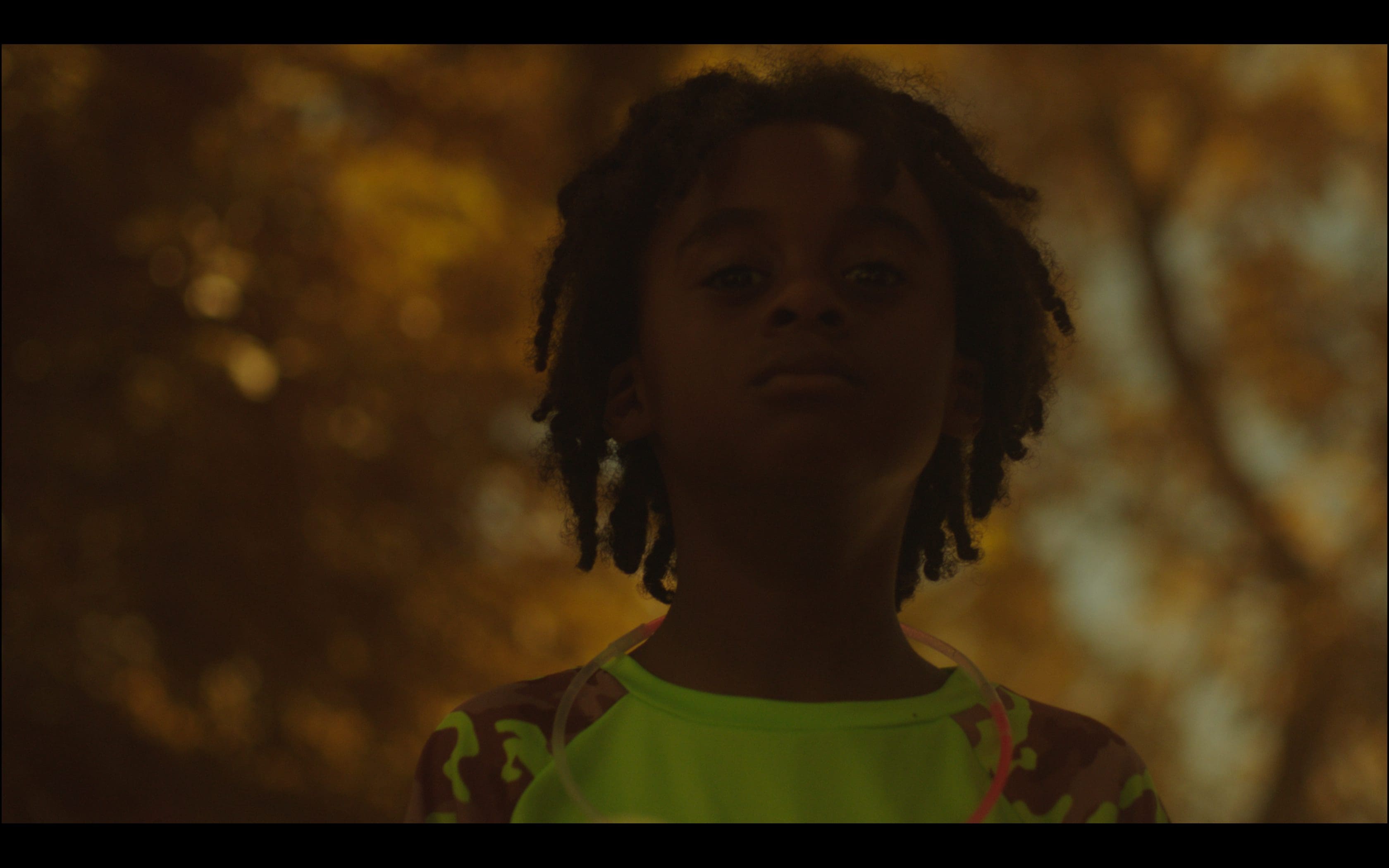
Watching the opening scenes of writer-director Merawi Gerima’s début feature Residue, it quickly becomes clear that it’s at least a little autobiographical. Like Gerima, its protagonist, Jay (Obi Nwachukwu), is a filmmaker who grew up in Washington DC’s Q Street neighborhood. Though Jay has been living in LA for the last few years, he returns intent on connecting with his old friends so that he can make a film about their childhood experiences before the majority black residents who’ve lived on Q Street for generations are gentrified out. Though Gerima’s film covers similar ground, Residue is fiction, but the truth driving it is captivating.
Part of that is because the cast is populated largely by first-time actors. From the group of men sitting on a stoop with whom Jay chats when he first arrives or his sweet and obviously-loving parents, every character feels so real that Residue almost reads like a documentary. That’s not to diminish Gerima’s skill in directing his actors, though. Indeed, it’s the strength of each performance that makes the film so emotionally powerful. While a scene with Hasinatu Camara as the grandmother of Jay’s friend Mike (Derron ‘Rizo’ Scotte) is among the film’s most potent, the standout performance comes from the director’s mother, Shirikiana Aina, who is also a filmmaker.
Aina plays Tonya, Mike’s mother. When we first meet her, Tonya hugs her son tightly, telling Jay’s father that she’s glad to have Mike back from a stint in prison and hopeful he can stay out. Though the scene is brief, Aina projects a world-weariness and cautious hopefulness that conveys the sadness she must have experienced because of her son. That sadness comes to a crescendo, though, much later, after Mike is killed. As Tonya walks through the pouring rain, we can see her devastation in her defeated posture. Her loss becomes even more upsetting when Jay and his father try to bring her inside, only for her to begin wailing in agony. It’s an incredibly effective scene and Gerima repeatedly gets that level of emotional commitment from every actor.
Still, impressive as the performances frequently are, by far Residue‘s most effective–and impressive–asset is the filmmaking itself. Gerima and cinematographer Mark Jeevaratnam shoot the film largely through close-ups—typically from abstract angles and with very limited focus. While the effect can initially be disorienting, it also consistently emphasizes Jay’s emotions and experiences. When Jay first pulls up to his childhood home in a beat up truck, he’s interrupted from a sense memory so real that he thinks he sees his younger self standing across the road by a white guy on a bike doing his best Karen act. As the man threatens to call the police if Jay doesn’t turn down his music or move his double-parked truck, the camera stays behind him, never showing his face. Indeed, as Jay experiences one microaggression after another from his new white neighbors, keeping them faceless emphasizes that this racism isn’t the problem of individuals, but a collective issue that results in Jay feeling unwelcome in his own childhood home.
However, while Gerima’s filmmaking is strong even in seemingly small moments, it becomes downright powerful when he uses it in service of larger character beats. By far Residue‘s most memorable sequence comes near the film’s end, when Jay visits, Dion (Jamal Graham) in prison. Though Jay initially balks, feeling awkward about visiting now despite never responding to Dion’s numerous letters, he eventually decides to go. When the camera first enters the visitation room, the image is so low-contrast and low-brightness that it’s almost impossible to distinguish anything in the oppressive, uniform grayness except the haunted look on Dion’s face. Just from those few moments, the audience can anticipate how depressing this scene is going to be. So, it’s both comforting and incredibly disorienting when Jay and Dion begin to talk and they’re suddenly not in a prison at all, but in the woods where they and the other Q Street boys used to play.
As they reminisce and roughhouse like the boys the once were, the early shots of a prison begin to seem like another one of Gerima’s visual metaphors. But then, in the middle of the woods, a guard pounds on a door to tell Jay and Dion that their time is up. Their memories of their idyllic shared childhood have literally transported them to a better place and as the guard’s pounding makes it harder to hold onto that former happiness, it’s understandable when Jay begins to sob. It’s peak filmmaking and Gerima consistently fills his film with that level of emotional complexity.
That said, potent as Gerima’s filmmaking is, the longer Residue goes on, the more likely the average viewer is to wonder if he is using these characters to meditate on the micro and macro effects of systemic racism or if they’re in service of a larger plot. So, it’s narratively satisfying, then, that what Jay does in the film’s final minutes feels both like a total surprise and Chekhov’s gun finally going off. It’s perhaps inevitable Jay’s final actions before the credits roll will sour some viewers on the whole film, but it’s perhaps best not to think of him as a character representative of a real person. Rather, Jay (and Residue itself) is a pure expression of a collective sadness, rage, resentment and hopelessness cultivated by generations of discrimination. Not to engage with those feelings simply because they’re difficult would be to ignore everything the last few months of social upheaval have stood for.

